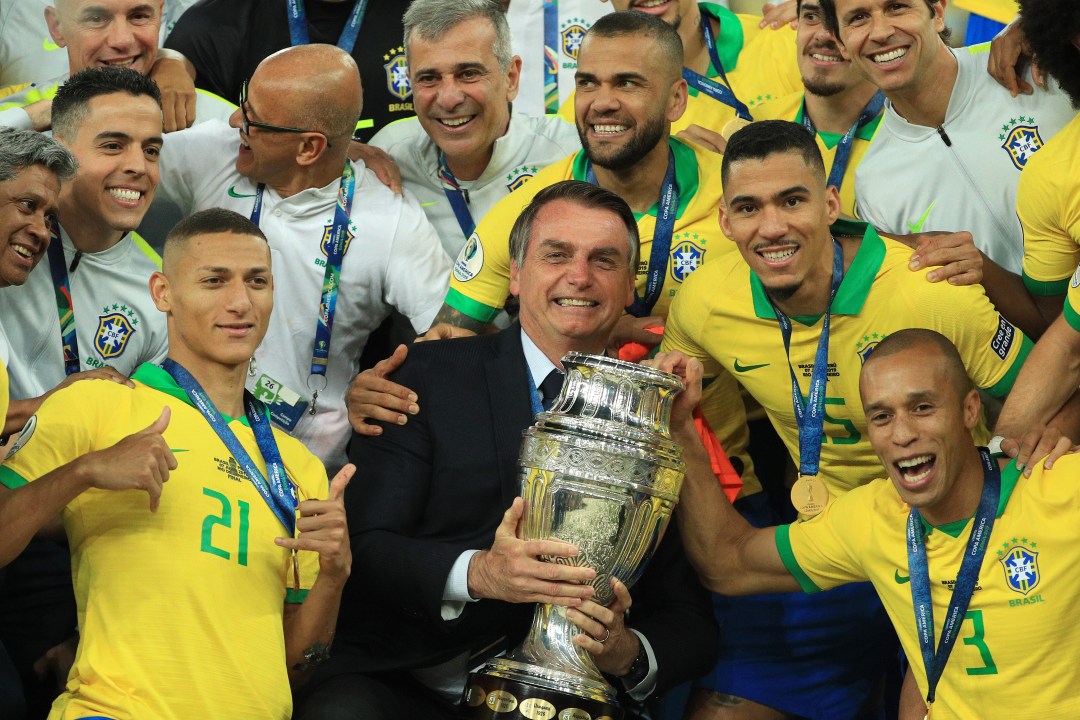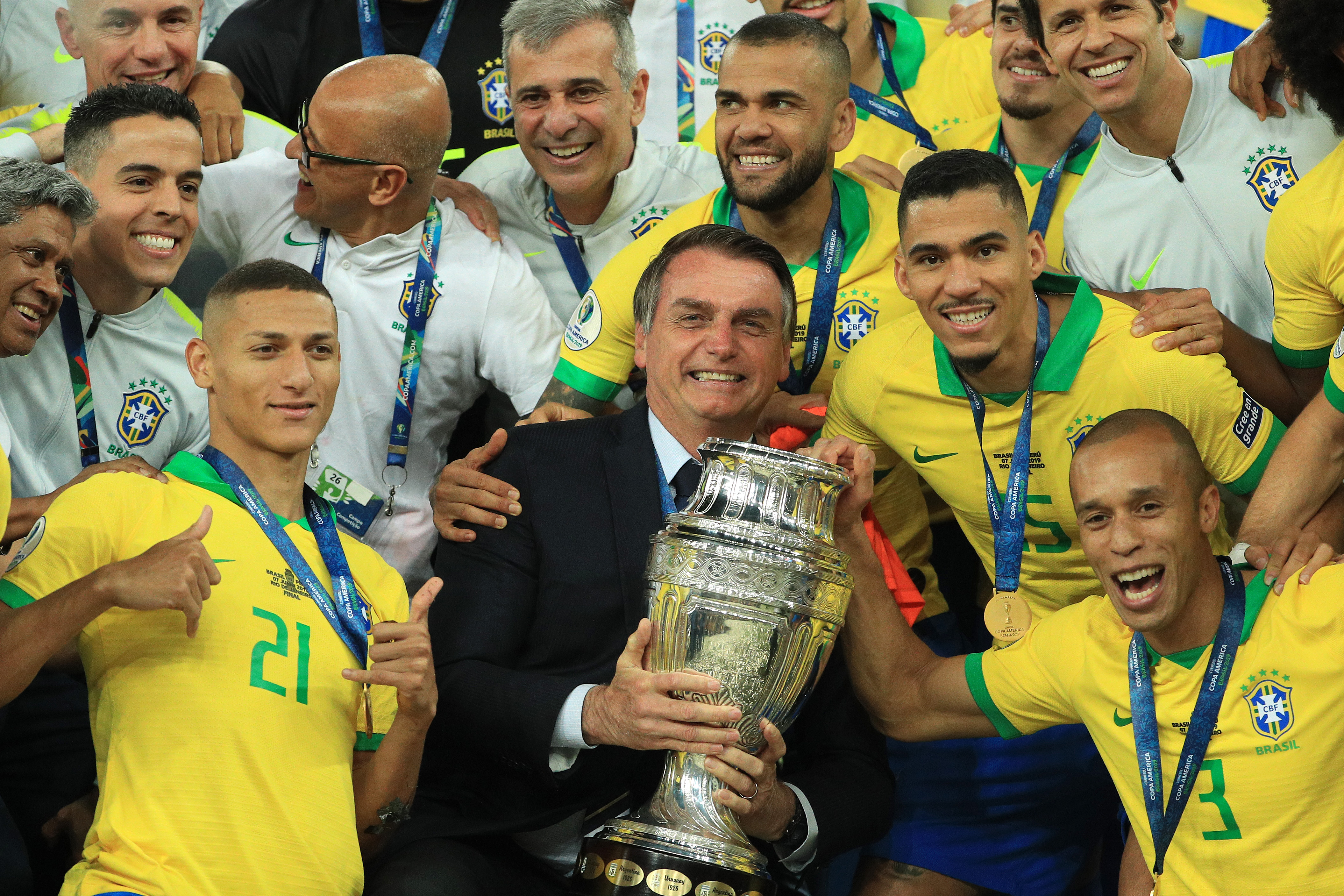There are weeks when Jair Bolsonaro dominates the headlines in Brazil and there are weeks when that honour goes to Neymar. Both men have been in the news this week, which is understandable given the run-off election for president is on 30 October, and the World Cup kicks off in less than a month. One plays to the far-right galleries, spends a lot of his time on social media, and is frequently defending himself against accusations of corruption. The other is the president. Most outside of Brazil, though, would find it odd that the news cycle in the last few days has been about the two of them together.
Neymar is in the news not just for his starring performances with Paris Saint Germain. In Brazil, where he is loved and hated in equal measure, he is one of several Brazilian footballers throwing their weight behind the Bolsonaro as he attempts to come from behind and beat leftist challenger Luiz Inácio Lula da Silva in next Sunday’s runoff election. (Lula won the first round by 48 per cent to Bolsonaro’s 43 per cent.)
The question of why Brazilian footballers back Bolsonaro has perplexed fans around the world ever since 2018, when he burst on to the political scene with his unapologetic mix of misogyny, racism and homophobia. Brazil is the home of the beautiful game, the cradle of Pelé, Zico, Marta and Ronaldo, the place where football transcended sport to become art. In just about every other field, with the possible exception of business, Brazil’s political, cultural and academic aristocracy are pulling together to prevent another four years of destruction. But not football.
Neymar’s support for the president might be personal. Just last week, Lula claimed the two men, with the help of Neymar’s father and agent, did a deal over tax relief. ‘He is afraid that if I win the election I’m going to find out how Bolsonaro gave him a pardon on his tax debt,’ Lula said in a podcast interview. ‘Bolsonaro obviously came to an agreement with his father.’ Bolsonaro responded by suggesting Neymar’s father sue his opponent for defamation and Neymar issued a statement protesting his innocence. On Saturday night, in a live chat watched by more than 1 million people, Neymar cemented the bromance by assuring Bolsonaro he’d celebrate his first goal in Qatar with a celebration just for him.
Bolsonaro has stronger backing among affluent men than any other category
Why other big names so readily back Bolsonaro might be related to footballers’ isolated existence. Top-level players travel in expensive cars and on private planes, from home to training to hotel to stadium. Few will see how Bolsonaro’s policies have led to increasing deforestation in the Amazon, a massive rise in poverty, and almost 700,000 dead from Covid. Fewer still will read about it.
Neymar, of course, is an evangelical protestant, like around a quarter of Brazilians, and therein lies another explanation for Bolsonaro’s appeal. Many footballers are evangelicals – just watch how many point to the sky after scoring or thank God in their post-match interviews – and the neo-Pentecostal churches are especially influential in the poor communities where many players grew up. Their gospel of self-determination rings true to young men who have battled the odds to reach the top in one of the world’s most competitive fields.
Bolsonaro has widespread support in the evangelical community, where preachers and pastors are accused not just of telling their flock to support him, but of spreading malicious stories about his opponent. Bolsonaro’s campaign has been sanctioned for repeatedly spreading disinformation and Neymar was caught in the act last week, too. The former Santos player posted a video of an incendiary far-right pastor and underneath it wrote ‘God Bless Brazil.’ Instagram slapped a “False Information” label on the post.
Top players earn more money in a week than most Brazilians earn in a lifetime and that obscene wealth is another factor in their support for a man who has demonised the poor, calling residents of the impoverished northeast illiterate and suggesting most people who live in favelas are criminals.
Polls show Bolsonaro has stronger backing among affluent men than any other category, especially in the southern half of the country, where most of those who reached international-level football were born or brought up. Lula, meanwhile, owes his first-round advantage to votes in the northeast of the country, still one of Brazil’s poorest regions. The lack of empathy is striking.
‘The players who support Bolsonaro are interested only in looking inwards, and if they think of anyone else it’s their family and friends,’ said Juca Kfouri, Brazil’s best-known sports columnist.
Of course, it could also be they’re just young and ignorant. Veterans of past World Cups are a bit more scrupulous, as an incident at the Ballon d’Or ceremony last week showed. There, in Paris’s majestic Théâtre du Châtelet, former Brazil captain Raí stepped onstage to present the inaugural Sócrates award, named after his brother, the revolutionary midfielder who captained Brazil at the 1982 World Cup.
Before handing the prize for charity work to Bayern Munich’s Sadio Mané, Raí raised his right hand and made an ‘L’. The gesture went unnoticed in Europe but it was the talk of Brazil. The L stood for Lula, who tweeted his appreciation.
‘Thank you, Raí,’ Lula wrote. ‘I was watching.’
The rest of the world is watching, too.







Comments